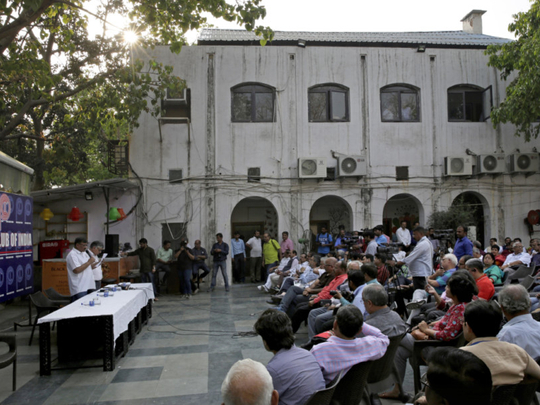
New Delhi: Media analysts have described the Information and Broadcasting (I & B) Ministry’s guidelines to regulate fake news as “an attack on the freedom of the press.”
The move, which was shelved by Prime Minister Narendra Modi Tuesday, is being widely attacked by senior editors as a brazen attempt to curb freedom of the press in the run-up to national elections in 2019.
“Here is why Information and Broadcasting Minister Smriti Irani’s move triggered such a backlash. The need to stop fake news is widely acknowledged, but the order said that any complaint against a journalist accused of running fake news meant that their government accreditation would be immediately suspended,” media analyst Vivek Saxena told Gulf News.
ALSO READ:
• Other instances of media gagging in India
• Modi cancels fake news order
• Indian journalists react to fake news rules U-turn
The Ministry’s press release did not define fake news but said that the complaints would be referred for determination to the Press Council of India (PCI) for violations in print, and to the National Broadcasters Association for violations on television.
According to sources in the Prime Minister’s Office (PMO), Modi was apprehensive about the reactions to the new guidelines. The sources said suspending a journalist’s access to government events and news conferences before the inquiry against them was completed was unfair.
But others feel the move against fake news was a good initiative.
“With an independent review mechanism, it would have been wonderful. Nowadays, a large volume of fake news is breaking on social media platforms such as WhatsApp, Facebook and other domains. This should be checked as well,” commentator Vijay Shankar told Gulf News.
“PM Modi directed the I&B Minister to withdraw the fake news press release seeing it as an attack on freedom of press. Not a great move. It means journalists can project speculation as breaking news and run hours of prime time nuisance. An independent body should assess and punish people for spreading fake news,” Shankar added.
Saxena says fake news needs to be defined first.
“Fake news is news without evidence. Today, any news which impacts a party/individual negatively is called fake news. It was a word coined by US President Donald Trump to highlight the ‘attempt by multiple mainstream media channels like CNN to change the true/real meaning of the event/news and twisting it in a way that they were not intended.’
“Indians have not understood its inclusive and exclusive aspects and have started using the term [blindly],” Saxena added.












